#Character Anaylsis
Text
Thinking about how Ford has created this image of Stan in his mind. We see this image through how he talks about his brother in the journal and interacts with him in the show. It's an image of this person who was suffocating and embarrassing and a burden.
Because if Stanley Pines was NOT those things, if he was instead a kid who was rough around the edges but trying his best and so creative and so full of love and always proud and supportive of his gold star twin....
Then Ford has to cope with the grief of losing that person.
266 notes
·
View notes
Text
amelia and the meaning of the prom in 14x3
it's that bit of extra poeticism they put in...it's a kind of showing-not-telling type of story that really makes Grey's Anatomy delightful for me.
we all remember 14x3 as the one where amelia processes the news that she has a tumor that's been affecting her impulse control for years. we remember amelia's 0.9% failure rate. we remember maggie's compassion for her sister, and the "brain surgeon with a brain tumor" line. what we dont remember is the c-story:
A high schooler is brought in due to a failed promposal. As they treat him, all the doctors reminisce about their own homecomings/proms, talking about how they all made poor decisions in their youth, and they were all a little insane.
at the end of the episode when amelia finally gets ready for surgery...i never realized but it's done like she's getting ready for prom.
someone zips up her dress.

brings her jewelry

and gives her those last touches of red.

Because Amelia feels right back there, back to Addison doing her hair, back to the feeling of being a young and insane teenager, unable to control her own cravings or impulses. We don't hear Amelia talk about her own prom, but we know the boy's proposal ended in pain, and it all feels like foreshadowing this massive disaster is coming with amelia. the one who always made it, but was never sure if it was luck or skill. this is the true test. and. its so small. but from a writing pov, awesome.
#greys anatomy#amelia shepherd#I LOVE THIS SHOW SO MUCH#i want amelia to be OK#owen hunt#meredith grey#grey's anatomy#bamf amelia shepherd#derek shepherd#amelia shepherd's brain tumor#character anaylsis#no one does a breakdown like caterina scorsone#caterina scorsone
18 notes
·
View notes
Text
Saeran Personas: all their regards towards you.
[Part 1] [Part 2] [Part 3]
Unknown: He thinks we're cute, and wants to help us as well as have us be useful to him. He sees us as his responsibility as well as the fact since he saw us first, he gets dibs. He sees us as his ally or tool, and he would like to have us as a companion, especially if we're like him and have a dark broken side. Of course we can't come in between him and his revenge.
Ray: You can say that Ray appreciates us as someone helpful and trusting, someone who won't betray him. He obsessed of the idea of us, but as he got to know us more he became more possessive over who we really were. We were a new friend for him, someone who would help him and listen to him and care for him. He wants to be a better man for us, but he he also wants to "protect" us from what he perceives as threats. When he doesn't do enough or thinks we hate him, he hates himself too.
Unknown (V route): I believe Unknown here regards us similarly to how Saeran regards us in the Ray route, as someone to "play" with. He could vent to us all he wishes, mess around with us, even hurt or scare us if he's frustrated. I think he wants a "companion," someone to sit in the room with him, maybe help him should he require it.
Saeran (Ray Route): He likes you, but he doesn't want to show it. He feels threatened by your interest in him, so he decides to approach you while also keeping himself away; he chooses to do this by abusing you. He wishes to prove again and again that your views are wrong about who he should be, that way you can't threaten him anymore.
Saeran: his final form considers you an angel, his form of paradise. He treasures you and is curious about you, he sees as you as the light that lit up his dark world. He sees you as an honest being, being true to yourself but also letting him realize the truths about himself. Saeran in his true form, loves us and idolizes us to an extreme level. Borderline personality disorder is coming into view here. He's placing us up on this pedestal, however unlike the disorder, he's not going to hate us at a moment's notice. He's choosing not to pursue that path.
#Mystic Messenger Ray#Mystic Messenger Unknown#Mystic messenger Saeran#Mystic Messenger analysis#V route#Ray route#Ray after ending#Mystic messenger#Character Anaylsis
13 notes
·
View notes
Text
Heya Scaranation!
I don't think anyone has ever connected this song to Wanderer, but it connects to him so well.
I'll be analyizing how this song connects to all 4 versions of Raiden Shogun's prototype puppet.
Song: Talkin about Bri.
Lyric connections
I killed that bitch Brianna with her body with her name, so if you see me irl dont call me that again(dont call me that shit).
Obviously Wanderer mentions that he has no need for these past names. Also he mentions to dislike his past actions.
Back when I went by Brianna, back when I ain't had a dollar, had to make ends meet.
Relating to his time as Kabukimono. Kabukimono is pinocchioish and impressionable. His personality forms from the people he alllows around him. Running away can connect to after his time in Tatarasuna with his betrayls.
Last I heard, she's gettin' meaner
Late Kabu stage, Kunikuzushi, Scara, even Wanderer.
I'd rather kill myself than reminisce on who I used to be
I'll put a bounty out on every memory someone has of me
Mentions that he never wish Ei created him at all. (in his trailer i think?)
He mentions that the descendants of the Raiden G. can hunt him down and he won't mind one bit.
You ever wish you could erase all that took place and just start clean?
Stuck in the past, too much regret
Can I go back, please?
He literally erases himself in the archon q, so you get it. I don't think per se he wabts to go back to his time before the Fatui. (Could be wrong?)
I sat up straight, I got straight A's, ate all the veggies on my plate
And yet; I'm 20, still a dummy
And I'm fucking overweight
If you chabge the lyrics to fit him, can relate to his time with Ei as Kabu and his present.
Techinicaly can be past as Kabu and his last days as Scara chasing a heart.
Do you like me, everybody?
Look to you for validation
In his past selves he was seeking attention from someone and it didnt matter if the attention was bad or good.
We are two separate entities
He has 4. Kabu, Kuni, Scara and Wanderer.
Thanks for listening to my analysis. This is his theme song as Wanderwr on my playlist.
I'll do another analysis for Freminet next time!
#genshin impact#genshin wanderer#genshin scara#genshin scaramouche#character anaylsis#Wanderer theme song
4 notes
·
View notes
Text
If you follow members of Studio Orange's staff on Twitter, they've said that every character has their own wants, likes, and dislikes, and each one of them could serve as a protagonist in their own right. Shoot, Vash can cover both positions of male and female protagonist because of the actions he's taken and what's happened to him as a result.
But if we had to pick a protagonist specifically to serve as the audience's eyes? That's Meryl (and Roberto for the more experienced fans but I'll get to that in a sec--).
I'm mostly looking at this through the usual three-act structure that folks are usually taught in Literature classes. Where it's "leave the ordinary world, travel through the "other" world, then come back to the ordinary world changed" path.
To be more precise, Act 1 is mostly world-building and establishing the baseline, then booting the protagonist out into the world for some character growth. Act 2 is the meat of the adventure, with its ups and downs, and normally ends with an emotional low before a moment of clarity that sends the protagonist off into Act 3, to confront the main villain in a climactic scene that quickly wraps up and ends with the protagonist going back to what they were doing before, or at least something similar. Changed, but still them.
Vash, from his perspective, has been in Act 2 for a long time. His big "call to action" -- which normally happens at the end of Act 1 -- could arguably be an interaction with Nai post-Big Fall, either in the immediate aftermath or in the crashed space ship when all their sister-Plants were put through a Last Run state right before Vash arrived. Which means that right now, he could be going through the emotional low right before the point of clarity that normally happens at the end of Act 2 and the start of Act 3, mere scenes before the climax.
But here's the kicker that means we're getting another season: Meryl and Nicholas are still smack-dab in the middle of Act 2. Especially in terms of character development.
Putting this under a cut because this is gonna get long.
So, if we're looking at the 3-act structure from Meryl's perspective:
Her Act 1 "normal" world is being a reporter-in-training, getting a mentor in Roberto, and her initial, normal world call to action is to go find information about Vash the Stampede. The "other world" call to action doesn't hit her until about Episode 3 when Knives comes in and completely destroys Jeneora Rock. After we've had some world development and pulled Meryl into the "hey, there's more going on here than you know" sort of scenario.
But that's the funny thing about calls to action. They can happen multiple times in a story -- just because a story follows a "three act structure" doesn't mean it has to follow those rules to a T. I say this because a mentor character's death can be a call to action, too.
Which brings in Roberto as the experienced fans' eyes. He knows about the villains, and even knows to be suspicious of Wolfwood when we first meet him in Episode 4. He fills in the newbie on what she needs to know about the world. He's jaded and knows there's danger around every corner -- and like the fans who hate Stampede, he doesn't want anything to do with it.
But Meryl -- the new fans -- keep pulling Roberto back in, and drag him along. As a result, Roberto and the old fans' eyes die in Episode 10, because they went along despite knowing what they know.
Roberto's death represents the kick in the pants Meryl needs to develop more closely to the character we remember her being in the old show, and it makes Meryl become the eyes of the old and new fans as a result.
Roberto's death may not be the end of her Act 1 if we count the first call to action as that end, but I don't think it's her true emotional low in Act 2, either. Meryl is fully submerged in the "other" world now, and is prepared to do what she needs to in order to help Vash.
(Granted, if we count each "season" as its own book and each book having its own 3-act structure, Roberto's death could absolutely be that emotional low before Meryl's Act 3, but we know they're not done with Trigun Stampede's story yet)
And then Wolfwood. His "normal/ordinary" world is the world that Meryl gets pulled into -- that of the Plant brothers warring with each other, and the Eye of Michael. He gets a call to action with his mission to guide Vash, but it's not the call to action that gets him moving into the "other" world yet. Vash attempted to give him one by saying "I'm trying to save you too" in Episode 10 after he got shot, but Wolfwood turned that down by letting him go to his brother alone.
Episode 12 is going to give him his real call to action that'll boot him straight into Act 2. I'm certain of it. Nicholas is Vash's foil, after all, and that means they both get development, damnit.
Which lets me circle back to Vash and how he's technically moving into Act 3 territory. Like I said before, he's been in the meat of his "adventure" for a long time, and there's a climax coming for him. But that's the funny thing with story climaxes: there can be smaller ones in Act 2 before we hit that emotional low and moment of clarity before the big one in Act 3. It's just that they're gonna be smaller than the big, final climax, and maybe even mimic how the Act 3 climax is going to go.
You see this a lot in book series, mostly because it's hard to end Act 3 with being back in the "ordinary but changed" world for every single book. That means starting up again with the basic world-building, etc for the next book, with Act 1 all over again. But nope. Sequels start in Act 2, because Act 1 only happened the once, and the protagonists haven't had their true final battle yet to get out of Act 3.
So Vash could still be in Act 2, and may even slide back a little in terms of development because of Knives messing with his memories. While it may not entirely wipe out what makes Vash who he is, memories are an important part of our core. They help tell us why we react to certain things emotionally the way we do. Here's hoping Knives left a little something behind when he messed with Vash, because otherwise he's gonna be very different from the person we've been spending time with the last 11 episodes.
And Knives? He's in the meat of Act 2, too, like his brother, although his call to action came much sooner -- it was when he saw Tesla, and thought he needed to protect his younger brother. His emotional low was when Vash pointed a gun in his face, followed by the clarity of "I need to force my brother to my side. He'll see, one way or another."
Which would place Knives in a climax point, either in a lengthened Act 2 or in his Act 3. But that doesn't mean he's done developing as a character -- far from it.
Because I think Vash is gonna give him reasons to develop next week. Whether Knives likes it or not.
#cross' rambling#trigun#trigun stampde#millions knives#vash the stampede#meryl stryfe#roberto de niro#nicholas d wolfwood#character anaylsis#story analysis#long post
49 notes
·
View notes
Text
The Stages of Choi Han
So I decided to think over and analyze the progress of the relationship between Cale and Choi Han.
While we do occasionally get some Choi Han's POV, most of the story is still from either Cale's or general point of view, so we don't see his exact step-by-step thought process on what his views were regarding Cale.
So, here's my thoughts on what was going on inside Choi Han's head as the story went:
Stage 1: Confusion
Choi Han must have been pretty confused when he first met Cale. Still in major turmoil after the Harris Village massacre, here comes this drunk rich guy along, who offers him food and shelter for the night. Why? Random act of kindness? Something else? And things remain confusing the next day as well. Choi Han gets to wash up and rest a bit after his traumatic experience, giving him better clarity of thought, but definitely no better understanding of Cale, who apparently doesn't even want Choi Han to pay him back. Not to mention this creepy strong assassin butler he has and his son the chef... I picture Choi Han having three big bold question marks in his head at this point.
Stage 2: Respect
Things change after the interview. While Cale and the people surrounding him are confusing, the way he speaks to Choi Han make two things clear: one, Cale is a smart man. Two, Cale has a lot going on, but it doesn't seem to be anything sinister. The general vibe Cale is giving off at this moment is "possibly sketchy, yet mysterious and wise". He strikes right into the core of Choi Han's insecurity and helps him gather his resolve: he wants to avenge Harris Village, but he also wishes to protect. At this point, Choi Han switches from confusion to intrigue.
Stage 3: Loyalty
Cale has no idea when it happens, but it is clear: after they rescue Raon, Choi Han is definitely having thoughts about staying with Cale for good. Not only did Cale prove to him that he was a good person by helping a young creature escape a terrible fate for seemingly no reason... Cale also showcased just how thoughtful and competent he is. He is not only smart and knowledgeable, he is also a skilled leader. Even if Choi Han still has any left-over doubts, his question of "what will you do if the Dragon decides to follow you, Cale-nim?" makes it apparent; he's 100% talking about himself. At this point, he'd definitely be willing to follow Cale on a permanent basis as his knight.
Stage 4: Trust
So Choi Han already respects Cale, and has begun cultivating loyalty towards him during the trip to the capital. After they part ways, Choi Han follows Cale's instructions about finding Rosalyn and Lock. During this time unexpected issues arise, but Cale's information remained consistently useful and accurate. Choi Han also meets the "Secret Organization" again, confirming that following path set by Cale allowed him to find out more about Arm than he could manage by himself. He quickly grows attached to Rosalyn and Lock, faster than in "The Birth of a Hero", because through Cale's endorsement he isn't nearly as distrusting. And when Lock seems sick, Choi Han's first instinct is to go straight to Cale for help. And that trust gets rewarded. Then it becomes reinforced once again by the Vow of Death. Cale got upgraded from "sketchy but wise" to "definitely a good person with a lot of secrets".
Stage 5: Protectiveness
Choi Han was definitely protective before, but it got cranked up to 11 after the Plaza Terror Incident. Cale reinforces all previous impressions of respect, loyalty and trust through handling the attack almost flawlessly - except at the very end, Cale gets hurt for the very first time. Choi Han is furious. He threatens the guards to let him pass, showing how his number one priority is officially, Cale himself. His quest to avenge Harris Village still matters, of course, but Cale already swore an oath that he would help Choi Han with it (at least that's what Choi Han believes), so that's a non-issue. From now on, Choi Han's first, second and third priority is keeping Cale safe.
Stage 6: Familiarity
After the plaza, Choi Han heads off with Rosalyn and Lock to the Breck Kingdom. But while the bonds of friendship grow stronger between them, Choi Han still has every intention of returning straight to Cale after they're done. Cale isn't just a priority; he's home, the place Choi Han feels safest at. The way Cale treats him when the trio comes back proves to Choi Han that the feeling was not unfounded; in his absence, Cale helped rebuild Harris and made it home for Lock's siblings. As the next few months of "general relaxation" pass, Choi Han only settles more in his conviction. Everything he has now is thanks to Cale, who is a good person, trustworthy leader, and a good friend overall. Choi Han's feelings are no longer distant respect of an employee, and now he sees Cale as his new family.
Stage 7: Conviction
This stage is a little tricky. While Choi Han's feeling don't quite change through the next 2 years, they definitely grow in strength and intensity. Multiple instances of Cale getting hurt, as well as Choi Han witnessing the true extent of his recklessness, make him devote himself entirely to Cale and his cause. While fighting Clopeh, Choi Han expresses his determination to "create path for the real legend". Because Cale isn't just family: Cale is special. He is someone worthy of highest admiration in Choi Han's eyes. It's not fanatical obsession, not like Clopeh's later on, but something deep and profound that grows stronger with every single battle. The ultimate proof of it is Choi Han changing his attribute while Cale watches from the sidelines. Choi Han's goal itself now, is Cale's success. That is his conviction.
Stage 8: Understanding
Choi Han finally finds out the truth about Cale's transmigration thanks to the memories from Choi Jung Soo, sent by the God of Death. And while none of it fundamentally changes what Choi Han believes about Cale... it does give him a bit of a broader perspective on who Cale really is. Before, there was a lot of mystery regarding the extent of his knowledge, but Choi Han was fine with being kept in the dark. Now, enlightened about some of the mysteries surrounding Cale... Choi Han's conviction to help Cale succeed becomes stronger. Cale isn't just a person he chose to follow; they're actually countrymen, connected by his nephew. It deepens the bond they have, and from then on, Choi Han feels less like a follower of Cale, and more of a peer. They're truly friends, going on this journey side by side.
So there you go. The 8 stages of Choi Han's friendship with Cale.
Confusion
Respect
Loyalty
Trust
Protectiveness
Familiarity
Conviction
Understanding
I really love how their relationship plays out. Cale has many great relationships in the series, but there's something truly special about these two. No matter their differences or misunderstandings, they can relate to each other like no one else can. The mutual care and respect they have for one another is heartwarming. After all they lost, now they have someone who they can trust with their back. A real ride-or-die type of deal.
#tcf#trash of the count's family#lcf#lout of the count’s family#cale henituse#cale#tcf cale#choi han#tcf choi han#anaylsis#tcf analysis#character analysis#tcf meta#friendship#i love choi han#he's just awesome#no wonder cale liked him as the protagonist of tboah#tboah might have been a super angsty mess but choi han is always cool
234 notes
·
View notes
Text
The Minyards’ and Hemmicks’ Names
I don’t think I’ve seen anyone point this out, but it was one of the first things I noticed when I read the books; Andrew, Aaron, and Nicky all have Biblical/Catholic names. It makes sense because Luther and presumably Tilda are Catholic, but their Biblical names also correspond with who they are as characters.
Andrew: In the Bible, he is one of Jesus’ 12 Apostles. He was brother to Simon Peter, who was Jesus’ closest Appstle. The name Andrew itself means “strong” and “warrior,” and in the books Neil narrates how strong he finds Andrew; we can also see him as a warrior when he protects Nicky especially as well as the other Monsters.
Joseph: There are 2 Josephs in the Bible and both fit Andrew’s character. The first is Joseph the father of Jesus on earth. He was seen as the ultimate protector because he protected the Holy Family and followed God’s call to stay with Mary. He protected Jesus from being killed as an infant by taking him and Mary to Egypt shortly after his birth. Obviously, Andrew is very much a protector. He is very protective of all the Monsters and frequently called a “mom friend” in the fandom. The other Joseph, is Joseph son of Jacob (Israel). He was the favorite son of his 12 brothers, and all of the brothers were jealous. Because of this, they leave him in a ditch and sell him as a slave to the Egyptians. As a slave, he works his way up the ranks to become the Pharaoh’s adviser because he can interpret dreams. Eventually during the famine, his brothers and father come to Egypt in hopes of finding food, and Joseph forgives them for selling him off. There is obviously the similarities of complicated brother relationships which is very much Andrew and Aaron, but I say he also relates to this because Joseph reconciles with his brothers, and post canon Andrew and Aaron begin to reconcile and really have a relationship with one another.
Aaron: In the Bible, Aaron is the brother of Moses and a high priest among the Israelites. He helps them along their journey to the Promised Land. One of the most notable things he does is while Moses is on Mt Sinai, he builds a golden calf for the Israelites to worship. When Moses sees this, he gets so angry and upset that he smashes the Ten Commandments and has to climb the mountain to receive them again. I see this as Aaron (Aaron) and Andrew (Moses) and their early relationship. After their deal is made, Aaron doesn’t understand the significance of this and instead goes against what they agreed to (kind of like—> Aaron and Moses were both priests and dedicated to God and Aaron went against that with the idol) and it almost reflects how Aaron beings to go against their deal.
Michael: Michael the Archangel is the warrior and protector of the Church, and he is the one who directly opposes Satan and defeats him. I see it as pretty fitting, because in the end, who is it that kills Drake?
I find the twins names so very fitting because not only do they relate to their characters, every one of them in the Bible had a brother. (If you count the other Archangels as Michael’s “brothers.”)
Unlike the twins, Nicky’s names are not the names of Biblical figures, but instead of Catholic saints.
Nicholas: St. Nicholas was known for his generosity, as he gave his wealth to the poor. And probably what he’s most known for, he gave gifts to the poor at night inside their shoes. (Which brought about the story of Santa Claus). I think this fits Nicky well, as he gave everything he had to the twins. He gave up living a normal teenage life to instead not go to school and instead work 3 jobs to keep him and the twins all afloat. Also more obvious, St. Nicholas is the patron saint of children and known as the protector of them. That very obviously relates to Nicky as he protects and cares for the twins.
Esteban: The English equivalent of Esteban is “Stephan,” and St. Stephan is known as the first martyr. He is actually mentioned in the bible, but doesn’t appear on page. He refused to denounced the Catholic faith, so he was stoned to death. This is similar to Nicky because Nicky again gave up everything for the twins, and he was the first person to really give everything he had for these two.
#aftg#all for the game#andrew minyard#aaron minyard#nicky hemmick#twinyards#character names#nora sakavic#anaylsis#analysis#trk#tfc#tkm
122 notes
·
View notes
Text
Also I don't who needs to hear this (everyone - everyone needs to hear this) but I'm fairly sure Jessica Drew's design is inspired by Pam Grier - aka. Foxy Brown
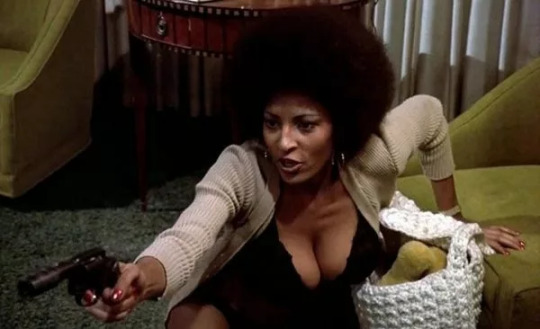

The afro, the tinted shades, the gold hoops - ALL deliberate design choices meant to hark back to iconic black culture and powerful black women from the 70's.
Jessica is meant to be a powerful, respected woman who is unashamedly and unabashedly BLACK - so they pulled directly from women who were (and are) powerful, respected, unashamedly, and unabashedly BLACK.
THEY ATE THEY ATE AND LEFT NO CRUMMBSS
#THATS why Jessica isn't a super warm mammy character#she's supposed to be a 'stone cold fox' - a bad mamajama thats her inspiration#The style is pulled largely from blaxploitation however Pam Grier was The IT girl at the time so it's mainly her#jessica drew#atsv anaylsis#across the spider verse#spiderman#spider man
468 notes
·
View notes
Text
I think something we don't take into account when thinking about Katniss (that people who solely take into consideration the film may not like...)
Katniss doesn't seperate (romantic) love from being married and having kids. Like at all. When she considers romantic feelings, marriage and children are what she puts into the basket to weigh. Being in love means to be married to her, to have children. Thats why she rejects them, and why they scare her. She can't be in love without linking her life to that person, without the idea of marrying them or children. That is always part of it, for Katniss.
She never considers maybe casually dating Peeta OR Gale. If she explores these relationships romantically, to her that almost certeinly means she will be eventually marrying them. Having kids. And it's not like she doesn't know it's possible. She says herself she's heard other girls talking about relationships, ones of high schools. Most of these likely without even the mention of marriage, and certeinly not children. No it's just that she's linked them in her head because thats what it is to her as a person. That's what she chooses for it to mean to her.
But oh yes. This is the girlboss, the rebel leader who don't need no man (heavy eye roll implied there).
I think the interesting question is if there is a cause to think, what is it aside from Katniss just valueing that kind of steps in romantic relationships? Part of me thinks it is simply an extention of Katniss, while not always the most confident or sure at 16-17 years old does not do what she DOES choose half way. Once she is in, she is ALL in with everything she does and to me, that could contributes to this connection for her.
On top of, while it does unravel with the death of her father she grew up with what we see even through small glimpes is a extreamly happy and loving version of this kind of family and end goal for romantic relationships. What a loving marriage looks like, what loving parents and loved children look like.
And I would like to add because I see this painfully often. No. This is not sending some anti-feminist message...say it with me: Because Katniss CHOOSES this, and it directly is canonically shown to make her happy. There are also several other female characters with diverse goals and positions. Including leadership. Just, so we are all clear.
#Everlark#katniss everdeen#Peeta Mellark#The Hunger Games#Meta#Partal character anaylsis#I like to think Peeta finds this out when they actually start talking about marraige.#He has to explain there wouldn't be any expectation of kids if they were married. They can just be married and choose not to have kids.#And that takes a hot second to set in. She never is entirely fully settled about it either. Though she is VERY happy it irks her.#Until toastbabies happen of course.
269 notes
·
View notes
Text

Thinking about this line again and now I’m wondering about Malleus.
We saw Meleanor, his mother, give a ‘blessing’ to him while he’s in his egg.
But then, did he get a blessing when he hatched?
Who did it? They took him away from Lilia so I don’t think he would have been able to, so could it have been his grandmother?
If it was Maleficia, I wonder what kind of blessing it was because we have seen how blessings affected Malleus and Silver to this day, haven’t we?
What if? The reason Malleus isn’t invited or is forgotten about is because of the blessing he got from Maleficia?
What if it was supposed to be a way to protect him? So he wouldn’t be in danger? But just like Meleanor’s, it backfired and made him lonely?
…but what if? Malleus was never blessed? What then? What if he never received one after he was hatched? (What if I just cry?)
If that is the case, I hope that he gets one from Lilia at the end 🥹🙏
[credit to @/mysteryshoptls for the translation]
#Hana queues#lilia vanrouge#malleus draconia#maleficia draconia#twst book 7#twst theories#twst theory#twst anaylsis#twst character analysis
102 notes
·
View notes
Text
"Stay weird" right, that's the big Hirsch GF thing? I would argue Bill embodies weirdness more than anybody else.
But then the other GF things are growing up and trust/love/family.
So here we have Bill who literally killed his family and doesn't have any good relationships, who BEGAN the "trust no one" stuff that took Ford's messiness to another level. He has isolated himself and rotted in that isolation for thousands of years and he's perfectly fine with hurting anyone who gets in his way.
Stan and Ford's lives are rife with isolation, decades of it. Healing for both of them started when they started letting other people in. All of the Pines are weird, but they find their people.
Whereas Bill says "I'm weird, and I will use my own inability to fit in as an excuse to be destructive."
#the book of bill#gravity falls#bill cipher#gravity falls thoughts#character anaylsis#stanley pines#stanford pines#stan twins#pines family
296 notes
·
View notes
Text
I think we don't talk about this scene enough, so let's dive in:
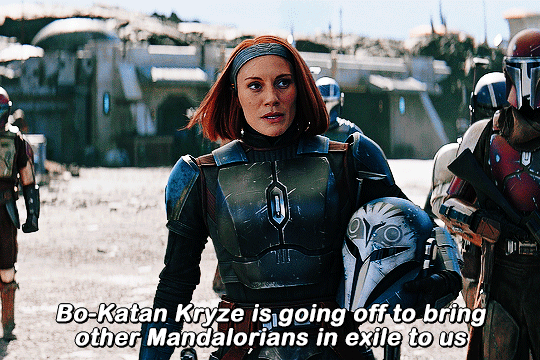
Earlier episode 5 establishes that Din and Bo had grown closer to each other, while staying at the Covert:

There's plenty of space so there's no need to sit so close to each other unless they've grown closer.
Now back to this scene where the Armorer asks Bo to remove her helmet.
She was hesitant, and we rarely see Bo being hesitant about anything.

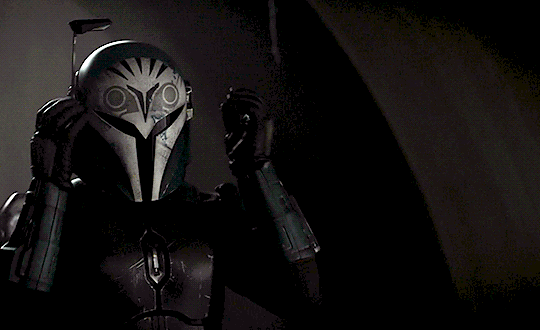
Now ask yourself why? Why was she so hesitant here?
Why wouldn't she want to get rid of her helmet? Not so long ago, she called Din's tribe a cult because of keeping their helmets on.
So what changed?
She lost her home. Din offered shelter. Then she *accidentally* joined his cult.
It's not indicated anywhere how much time passes between episode 3 and 5, but I would say at least a few weeks, if not a couple of months.
So why wouldn't she be relieved to receive the chance of removing her helmet?
You could say, well because she would become an apostate in the other's eyes, and therefore would be thrown out of the Tribe.
But, the Armorer refutes that by explaining "Bo Katan is walking both worlds."
But she is not concerned with the others, at least not at first. Her whole attention is hanging on Din's reaction.
She's afraid of losing his respect, and his friendship they had forged during their time together in the Covert up until this point.
She seems to want to say something in her own defence, but can't, because there's nothing. Instead, she's pleading with her eyes. (Katee's acting here is phenomenal)
This moment is about whether or not Din will reject her for taking off the helmet, like her Nite Owls rejected her for not getting the Dark saber.
And we know, that he not only doesn't reject her, (like he did in the past at their first meeting), but he joins to help her seek out her fleet.
From this point on, Bo is looking for his approval, and support.
Continuously!


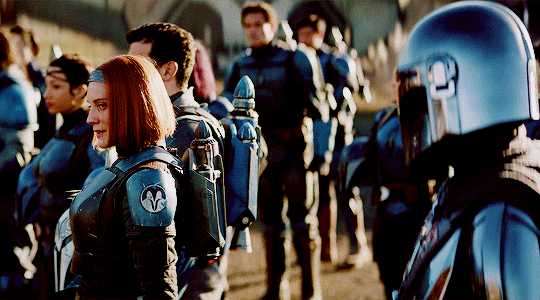

It's so intriguing to watch how much she comes to rely on Din.
Then the pledge scene:
She's completely taken off guard.
She didn't expect him to support her after revealing how she surrendered, which inevitably led to the Night of a Thousand Tears.
This time Din goes beyond the simple nod of support by pledging his undying loyalty.

This marks another turning point in their relationship.
*Don't even try to tell me this isn't romantic as hell!!!*
It's clear where their relationship is heading.
She even says it:
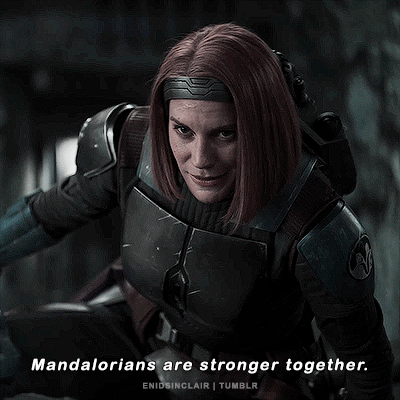
Gif credit to: @enidsinclair
#din djarin#dinbo#bodin#bo katan#the mandalorian#the mandalorian season 3#star wars#bo katan kryze#din x bo#radom#anaylsis#scene analysis#looks like a established relationship to me#character growth#good acting#story progress
397 notes
·
View notes
Text
Also nothing like my usual post, but I couldn't help but think of it.
For those of you that know about Danganronpa, particularly Danganronpa V3, I just had a thought I think might help people understand a character more.
You all know Kokichi Ouma, right? How Kokichi Ouma has a no killing rule in his organization? (Something that is probably important to have when your group mainly goes around committing illegal activities. The longer you do such things, the easier it becomes to do and the lines get more blurred. Which is why the rule probably exists and isn't an unspoken rule but one that's clearly outlined. Because members of the group actually have the potential to do such a thing.)
Well, that doesn't necessarily mean that Kokichi is morally upstanding like some like to make him out to be because all this rule does is ban killing. But everything else is on the table. Another way I just recently thought to put it in-- you know Batman, right? How Batman has a no killing rule? But he'll do everything but kill you? He will send you to the ER and brutally disfigure you if need be, but he won't kill you.
I think that's how people should start looking at Kokichi. Not a pioneer of justice like Batman, but someone who is willing to do everything but kill someone.
(Not that I think Kokichi would send someone to the ER. The fact that I think he was scared of Katio when he punched him makes me think Kokichi just doesn't like violence in general, and has a personal hatred towards the art of killing. But, I think Kokichi would be down for breaking-and-entering, as well as stealing and everything like that. I don't think that would bother him in the slightest.) (Though, Kokichi's seemingly personal hatred to the idea of killing makes me think something may have happened to him, which is a completely different analysis than this one, as such I will not be going into in.
Which, I would like to point out, I also think Kokichi was trying to get everyone killed by Chapter 4. If he figured out they were being watched, he probably figured out they weren't the only people to participate in a killing game, he also probably figured there would be future ones. So to stop the games, he would make it unplayable to the viewers. (In other words, even if he got the rest of his peers killed, they were doomed after the first killing, it was probably better from his perspective to ruin the game and prevent any future games from being held. Saving the future people, instead of his peers basically.) (A choice he and Maki, Kiibo, Shuichi, and Himiko would have ironically shared if that was the case.)
The reason I say this is because I'm frustrated with people making Kokichi this "soft boy" who did no wrong and was only trying to help everyone, or making him a horrible hypocrite with no values. When in truth he's morally grey, was long before he even set foot in the killing game, and was then put in a killing game that would make anyone's morals worse. If anything his actions are an attestment to how much he clung onto those morals and beliefs. (He was far from the only person that's actions that got others killed, and he didn't have the worse motive by far. It shouldn't be swept under the rug, but he shouldn't be automatically worse than every character for his actions just because of a rule he has with his organization. A basic rule that everyone in society has, though it normally doesn't need to be lined out.)
Which, this is just how I view Kokichi, and it may not even be accurate. Just a thought.
#kokichi ouma#drv3#drv3 kokichi#danganronpa drv3#drv3 killing harmony#danganronpa#danganronpa v3#ouma kokichi#kokichi oma#danganronpa kokichi#anaylsis#character analysis#kokichi analysis#kokichi ouma analysis#kokichi oma analysis
30 notes
·
View notes
Text
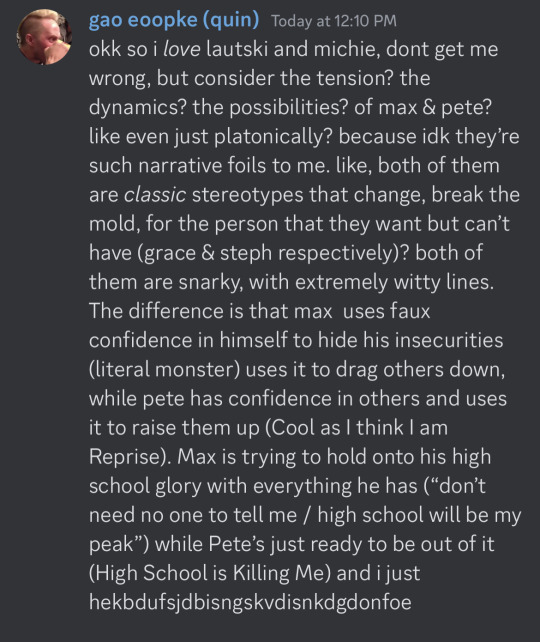
went on a tear the other day,,, think i mighta been onto something
#nerdy prudes must die#starkid#starkid nerdy prudes must die#hatchetfield#peter spankoffski#pete spankoffski#max jagerman#anaylsis#spankerman#jägoffski#narrative foils#foils#character foils
82 notes
·
View notes
Text
My first contribution to this fandom is this six page essay i wrote on gloxinias morality for ethics class.
More under the cut
Gloxinia of Repose is a character from the Netflix show The Seven Deadly Sins, and ultimately one of the more interesting characters within the show. Gloxinia’s morality is a warped and twisted version of consequentialism. Gloxinia serves as a minor antagonist through the series, though in the end he ends up as something akin to a ‘hero’. However, due to the nicheness of the show itself, some background information is vital to understanding Gloxinia’s complexly twisted morality.
The setting of The Seven Deadly Sins is a vaguely medieval time period, with a fantasy genre. Gloxinia is part of a gang labeled The Ten Commandments whose goal is to take over the land of Britannia. Opposing The Ten Commandments is a group called The Seven Deadly Sins.
It’s a rather simple ‘good versus evil’ fight, with The Ten Commandments generally having some twisted morality and a dislike for most of the other races.
However, Gloxinia was something of an odd character. He was not outright bloodthirsty. He was sadistic and childishly cruel, yes. He seemed to prioritize fun over actually doing his job properly, and was willing to put on a big performance rather than fighting with all his might. Most notably, Gloxinia had a particularly pessimistic view of the world and seemed to have some sort of grudge against humans. He even went so far as to call them a “Vial repugnant race”. To add to this, he also was shown to be rather lazy and self centered. The only person he was actively nice to was his friend Drole. Every other person who allied with the humans, he attempted to kill in the most fun way possible and was shown to get rather annoyed when people strayed from his little ‘game’.
Then, he did a quick switch up. He stopped being awful after he helped to kill his ex friend, Meliodas. All through the fight scene with Meliodas, Gloxinia could be seen actively feeling bad. This scene is extremely important, because it proves that Gloxinia is not sociopathic. He does have some sort of twisted morality behind him.
Then, after that, he switches and decides to help out The Seven Deadly Sins, giving Harlequin and Diane a large portion of his own power to do so. He discovers his dead sister was still alive, and ends up sacrificing himself in order to let The Sins escape from the demon Chandler, and to attempt to make up for all of his wrong doings. He ends up dying rather quickly, but he seems content with his choices, as he did die with a smile on his face.
Through all of this, he also has his friend Drole right by his side. The two even end up dying together. Drole and his sister were his favorite people, and Gloxinia was not ever shy in showing that. He would heal Drole with a very limited healing ability, and the loss of his sister incited a 3,000 year long mental breakdown. This mental breakdown is where his crueler persona developed, and it’s what caused Gloxinia to join The Ten Commandments to begin with.
Yet, despite his clear adoration for his friends, he did not extend the same kindness to Meliodas. He actively helped kill Meliodas, and while Gloxinia clearly felt bad for Meliodas that did not stop his horrible actions. So the question is: Why? Why was Gloxinia willing to pick and choose which of his friends he killed off? Why was he willing to heal Drole, and go on a warpath for his sister Gerheade, yet he could not even find it in himself to spare his other friend? They all seemed just as close from the few interactions we saw. So what on Earth made Gloxinia willing to pick and choose between his friends? Well, the answer is simple. Gloxinia is a consequentialist, and he believed killing Meliodas was for the greater good.
According to Russ Shafer, author of The Fundamentals of Ethics, fifth edition, “If you have a choice between two options and the first is less good than the second, then the first can’t possibly be right.” This is a good way to sum up the entire thought process of consequentialism. The whole moral theory is based upon doing whatever good possible (Shafer-Landau). It is about minimizing damage and picking the best option from the wreckage, even in a bad situation (Shafer-Landau).
However, consequentialism is not without its issues. It is a rather easy morality to sway if you have the wrong ideals. As put by Alvin I. Goldman, author of RELIABILISM, VERITISM, AND EPISTEMIC CONSEQUENTIALISM, “Consider Judith Thomson's (1976) example of a transplant surgeon who encounters a patient during a routine check-up and decides to chop him up, take his organs, and transplant them in five other patients, each in need of one of those organs. From a teleological point of view, this action is good, perhaps even right. Greater overall happiness will be promoted by this action than by simply attending to the original patient and letting those in need of organ transplants die (Goldman).” As Goldman puts it in this quotation, prioritizing the needs of the many is not always necessarily ethical.
Now, this relates to Gloxinia and his moralities quite easily. He felt Meliodas was a threat. Meliodas had been branded a traitor to the demon race and The Ten Commandments were supposed to kill Meliodas and free the rest of the demon race from the seal.
Gloxinia had always been the type to weigh his options carefully. To try and choose the least harmful path, or the path that did the most good, as consequentialists tend to do. It is important to note that after being betrayed by a group of humans, Gloxinia saw humans as evil at this point. This is absolutely integral to his character, and the choices he makes. He chooses to try and kill Meliodas, one of his oldest and only friends, because Meliodas sided with the humans.
To Gloxinia, killing off all of the evil humans who tried to kill his sister was a good thing. Humans were a disgusting race which he despised. It only made sense for him to try for genocide. Meliodas was an obstacle to him at that point, and Gloxinia, in the truest consequentialist fashion, chose to help kill Meliodas. Gloxinia was clearly not happy about it, indicating that this decision was not one chosen lightly. This was something that made him consider his own moralities, and ultimately choose to attempt to do something that felt less wrong to him. Which is where helping Harlequin and Diane came into play.
He ended up helping them figure out how to be more powerful, while also informing them on the events that led the demon race to be sealed to begin with, as well as the events that led him to ultimately become a Commandment.
It would be a crime to speak on all of this, and leave out the most important event of Gloxinia’s life. An event that he based his entire morality off of, and the one that led Gloxinia to being a Commandment. His sister's death.
This whole event happened because he trusted a group of humans. The humans ended up betraying him and cutting off his sister's legs, her eye, and half of her wings. One human defected from the group and tried to save Gerheade, but Gloxinia spotted the human holding what he assumed was her mangled corpse and murdered the human. Then, Gloxinia went on to continue killing humans. As many as he could find. Zeldris found him and offered to let him join The Ten Commandments.
This was the greatest showing of his consequentialist nature showing through. To Gloxinia, killing off humans was for the greater good. The action may not have been fun, but it was something that had to be done. Or the humans may go around doing the same to others. While Gloxinia certainly did have fun with it, he still was doing it willingly.
What Gloxinia experiences when he changes sides and decides to kill humans is actually referred to as moral disengagement. Which, according to Helet Botha, author of Existentialist Perspectives on the Problem and Prevention of Moral Disengagement is “ Moral disengagement was originally conceived of as a psychological process—a set of cognitive mechanisms—whereby an individual becomes capable of dissociating with their internal moral standards and thus behaving unethically without feeling distress (see also Newman et al., 2020) (Botha).” This is how Gloxinia was able to do such a quick switch from liking humans to hating them.
Some people may attempt to argue that his morality could possibly be psychological egoism. A good way to sum it up is by Di Carlo Emiliano, author of Antecedents of Deviant Behavior: Psychological and Non-Psychological Factors and Ethical Justifications, “According to the homo economicus assumption, the human being is a self-serving individual only interested in maximizing its utility function (Jensen & Meckling, 1976) (Carlo Emiliano).” In other words, humans are selfish. They put themselves first, for better or worse. And considering how Gloxinia attempts to commit genocide against humans due to his own trauma, it may certainly see that way.
There’s no denying that everything Gloxinia did was tinged with a bit of selfishness. He killed, he separated families. Broke apart entire generations all because he decided he hated something. His sister turned out to be alive after all, and he apparently just left her there. He certainly thought she was dead, but that does not change the fact that it was selfish. Not only that, but a lot of Gloxinia’s dialogue would lead you to believe that he truely and genuinely believes that all humans are selfish. And he absolutely does. Which is why he goes out and kills the humans he’s killed.
“Is it appropriate to sacrifice one person to save many?” Is the question asked by Yoshiyuki Takimoto, author of Verification of the Japanese Version of Greene’s Moral Dilemma Task’s Validity and Reliability. This question is a great example of consequentialism, and Gloxinia’s overall mortality. He is willing to sacrifice one person to save many. And in the end, he sacrificed himself to try and slow down the demon Chandler. He lost and died. It was his way of bringing good out of all of the bad he had caused. The ultimate sacrifice.
So, with all of this being said, it’s quite clear that Gloxinia of Repose from the Netflix show The Seven Deadly Sins had a consequentialist morality. He constantly weighed the pros and cons of his own actions, was deliberate in the way he approached things, and consistently did his best to try and bring true goodness. Even though it was a very flawed and scary stance to take- genocide just really isn’t the correct answer for most problems. He still took this stance with the idea that what he was doing was absolutely and entirely good. And in the end, in an attempt to make things right, he sacrificed his own life. He died for his morality, his viewpoints, and to protect the very friends he tried to kill.
Bibliography
Shafer-Landau, R. (n.d.). The Fundamentals of Ethics (5th ed.). Oxford University Press.
Goldman, A. I. (2015). RELIABILISM, VERITISM, AND EPISTEMIC CONSEQUENTIALISM. Episteme,
.10th Anniversary of Episteme, 12(2), 131-143.
https://doi.org/10.1017/epi.2015.25
Di, C. E. (2022). Antecedents of Deviant Behavior: Psychological and Non-Psychological Factors and Ethical Justifications. Employee Responsibilities and Rights Journal, 34(2), 169-191. https://doi.org/10.1007/s10672-021-09387-x
Di, C. E. (2022). Antecedents of Deviant Behavior: Psychological and Non-Psychological Factors and Ethical Justifications. Employee Responsibilities and Rights Journal, 34(2), 169-191. https://doi.org/10.1007/s10672-021-09387-x
Takimoto, Y., & Yasumura, A. (2023). Verification of the Japanese Version of Greene’s Moral Dilemma Task’s Validity and Reliability. Psych, 5(1), 224. https://doi.org/10.3390/psych5010017
#this is what mental illness looks like folks#six pages on a fictional character#SIX PAGES#i got a B on the essay btw#the moral of this story is that gloxinia is an asshole#and would tear down the world for his morals#and id tear down the world for him#seven deadly sins#morality#fairy king gloxinia#7ds#anaylsis#headcanon#ten commandments#gloxinia#gloxinia of repose#first fairy king gloxinia#sds#nnt#nanatsu no taizai
28 notes
·
View notes
Text
Clock 0ut Theories!
okay so me and @skeliiix have been theorizing about the new sad-ist animation "Blank Decay" which is another animation in her Clock 0ut series that starts with "Yellow Zone"
So if we look back to Yellow Zone, Sad-ist tells us that it's inspired by the video game the Stanley parable. (which is a great game by the way) In this video we see our main character, who we'll call Stanley working a desk similar to the video game. We're then introduced to another character (possible based on the narrator?, we'll call him Yellow for now) watching Stanley and his coworkers (more scribbles than actual people and Yellow seems to have control over them) through a system of camera monitors. The animation then launches into a series of escape attempts by Stanley only to be thwarted by Yellow and killed. Every time Stanly dies he awakens back in his desk and tries again. Only on the last try, instead of going to the exit, Stanley makes a change and ends up going for the window that Yellow is behind. They fight and Stanley ends up taking a clock from Yellow, he then slips, breaking the clock. The clock breaking seems to have some sort of effect on both Yellow and Stanley, causing them to begin to "glitch out" and for the clock to go haywire. Yellow's eye also fill completely giving the idea that he is not entirely human. Stanley then punches Yellow and breaks the clock and the animation ends.
This now brings us to.
Blank Decay!
Blank decay starts out a distorted version of maybe what the wo
rld outside of Stanley and Yellow's office is like? With the beginning scene having TV's that are similar to Yellows monitors cracked and broken. We then see Stanley, looking quite worse for wear running around this city. We then see a cube shaped monster with many legs and two square yellow eyes following him. Stanley makes it to a safe building and enters. We then see a man looking at different glasses. Surprise surprise! It's Yellow! He then sense a presence grabs a pipe and whips around, it's Stanley! The two seem to be on better terms know, but they soon get into an argument. There's no dialogue so its unclear what they are saying, just as Stanley is about to hit Yellow, a crawly cube with yellow eyes (CCYE for short) appears over them and jumps down to attack them. As their trying to escape the CCYE shoots and hits Stanley in the side, he falls to the group and glitches, as that happens you can see for a split second that he glitches to his old work clothes and then a skull appears over his head.
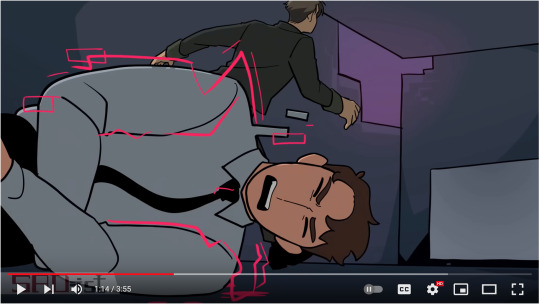
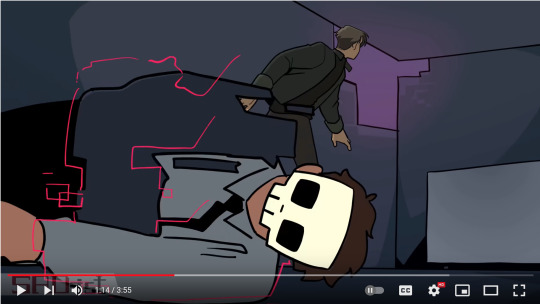
Stanley hits the CCYE with a pipe which doesn't really do anything, Yellow then hits the CCYE with a chair causing it to divert its attention to him and cornering him against the wall. Yellow then see's a gear in CCYE's eye and reaches out to grab it which makes his arm go black with yellow lines running through it, almsot cyborg esc. The CCYE then explodes. Causing electricity to spark along side Yellow and for his eyes to fill like they did in Yellow Zone. He is left with the gear in his hand.
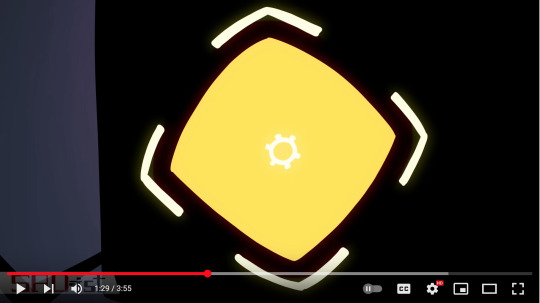
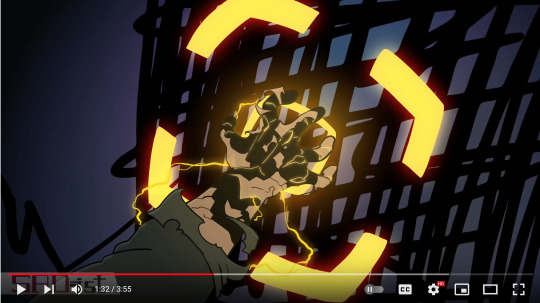
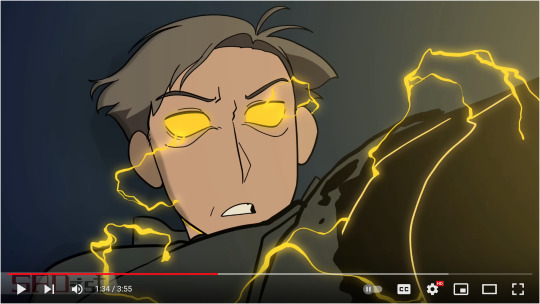
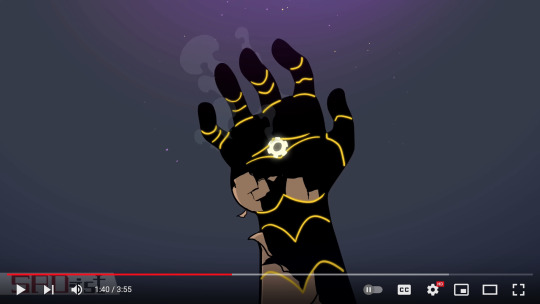
Yellow then runs over to check on Stanley who is bleeding out, but not before pocketing the gear. Yellow tends to Stanley's wound and we then get a shot of Stanley sporting either what could be a bandage or a metal plate. Which then switches to what seems to a be a flashback of all the different ways Stanley has died in the past.
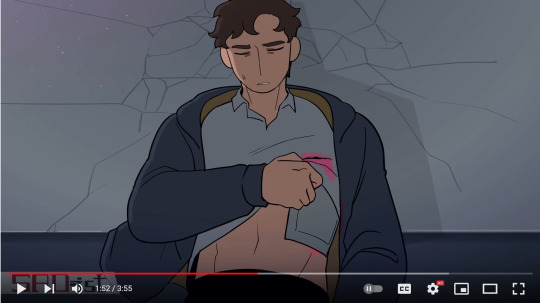
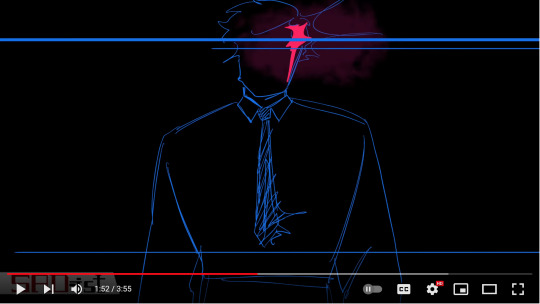
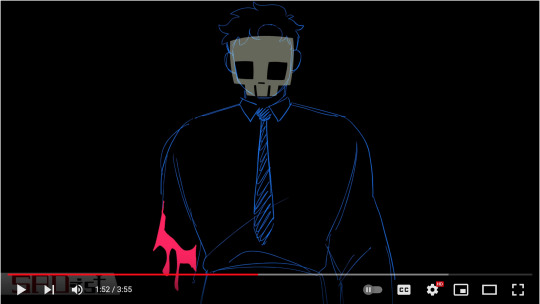
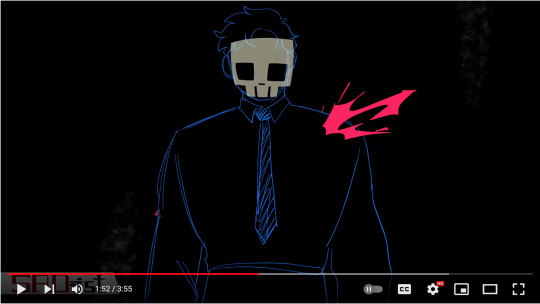
It then cuts to Yellows eye's implying that he is the one remembering all this. The pair walk through the weird city until Stanley spots a door with an exit sigh above it. The two begin to make their way to it. Stanley tries to open it but finds very hard to open (that door must be really jammed for a guy who sent his boss FLYING with one punch). Yellow then notices more humanoid versions of the CCYE (those will be humanoid squiggles with yellow eyes HSYE for short). These beings look similar to Stanley's old coworkers, here's an example. (HSYE on the left and the coworkers on the right, more on this later)
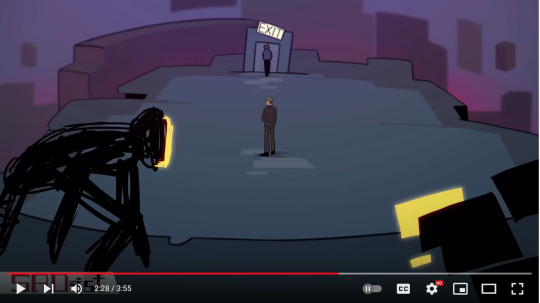
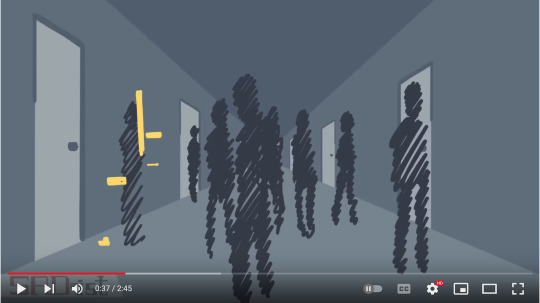
Yellow runs to Stanley but doesn't make in in time as Stanley is struck by a fatal blast by one of the HSYE, Yellow is also hit but only looses an arm, which doesn't seem to effect him very much (he also bleeds yellow!) The HSYE along side some smaller CCYE keep attacking the two. Yellow tries to stop the bleeding while Stanley continues to glitch like the last time. Sadly, Stanley dies. Yellow then begins to attack the HSYE and CCYE, although he gets shot and looses a leg. A HSYE pins him on the group but Yellow quickly flips it over grabs the gear in it's eye and again explodes it, this time the electricity bounces to the other HSYE and CCYE exploding them too and leaving the gears.
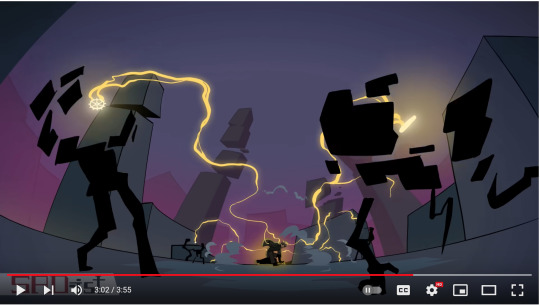
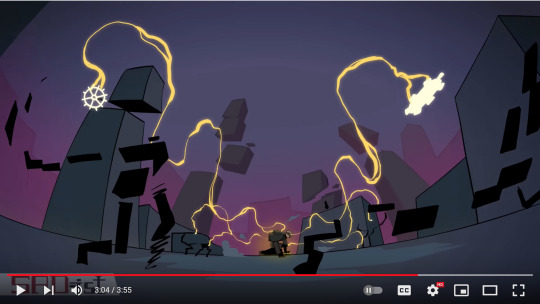
Yellow notices his dead companion and begins to use the gears to make something. The something turns out to be the clock from Yellow Zone. The Clock then rewinds and we are met with what seems to be Stanley waking up at his desk like in Yellow Zone.
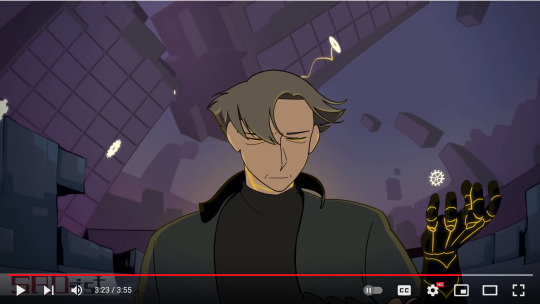
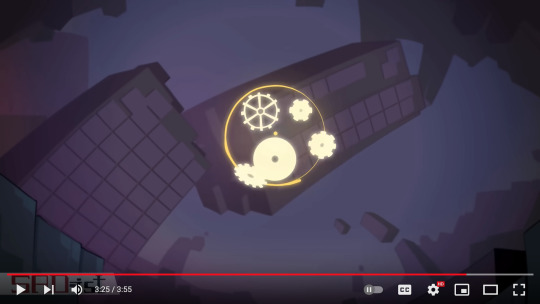

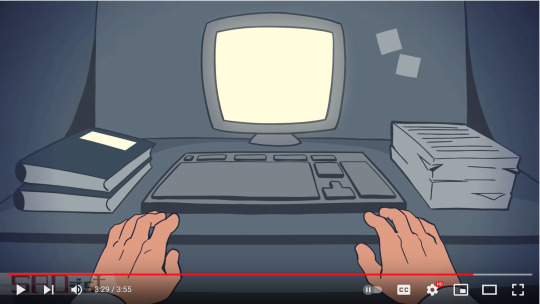
Stanley is shocked and begins to cry. The animatic ends with Yellow and Stanley looking at each other from an un-distorted office space. Both back in their original clothes from Yellow Zone.
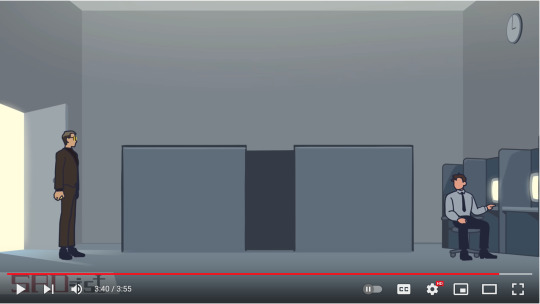
So that's the two animatics! You're probably thinking "Ace aren't you gonna tell us your theories? We've already seen the animation."
OKAY HERE YA GO HERE IS WHAT MY LOVELY BEST FRIEND AND I HAVE THEORIZED.
Stanley and Yellow are on better terms
this one feel a little obvious as the two are traveling in a pair and Yellow seems to care for Stanley, so something has happened inbetween the time from Yellow Zone to Blank Decay where they have gotten closer.
Yellow caused the apocalypse
Okay so, we had the feeling that Yellow has something to do with the state of the world currently, the HSYE look like the coworkers from Yellow Zone. Yellow seems to have control over them or even created. We thought that someone by breaking the clock Yellow no longer has control over his creations there fore sparks the apocalypse
Yellow is totally not human
okay this one is kinda obvious as well, as he's kinda a cyborg, can't seem to die and he bleeds yellow. So yeah. that's that.
Yellow "reset" at the end of Blank Decay
So el mentioned something about yellow's code resetting, if we go with the idea that he is come sort of cyborg, if the clock breaking in Yellow Zone is what causes it. Then the clock being rebuilt and resetting the timeline must mean that Yellow was reset as well. There's also evidence that Yellow has changed character wise and it seems that he seems to care for Stanley and is worried for him. It's also clear (to us at least) that he has some sadness in resetting the time line, we don't think that would have been shown if Yellow knew he wasn't going to be reset. ALSO! Stanley's reaction doesn't seem quite normal for being brought back to life, I don't know as I've never actually be resurrected so if anyone has please correct me, but we think that Stanley's reaction is in part to realizing that he just lost Yellow as he knows that this "reset" will make him revert back to his old character.
Yeah so that's what we have, feel free to talk to us about it in the reblogs and share your own theories! This got really long but we really enjoyed talking about it!
#our minds so big#just call us matpat#i'll be mat#el can be pat#we r so cool#not my art#theory#my theories#theories#anaylsis#character analysis#sad ist#sad ist animation#clock 0ut#blank decay#yellow zone#the stanley parable#clock 0ut theory#the clock 0ut series#blank decay theory#yellow zone theory
187 notes
·
View notes